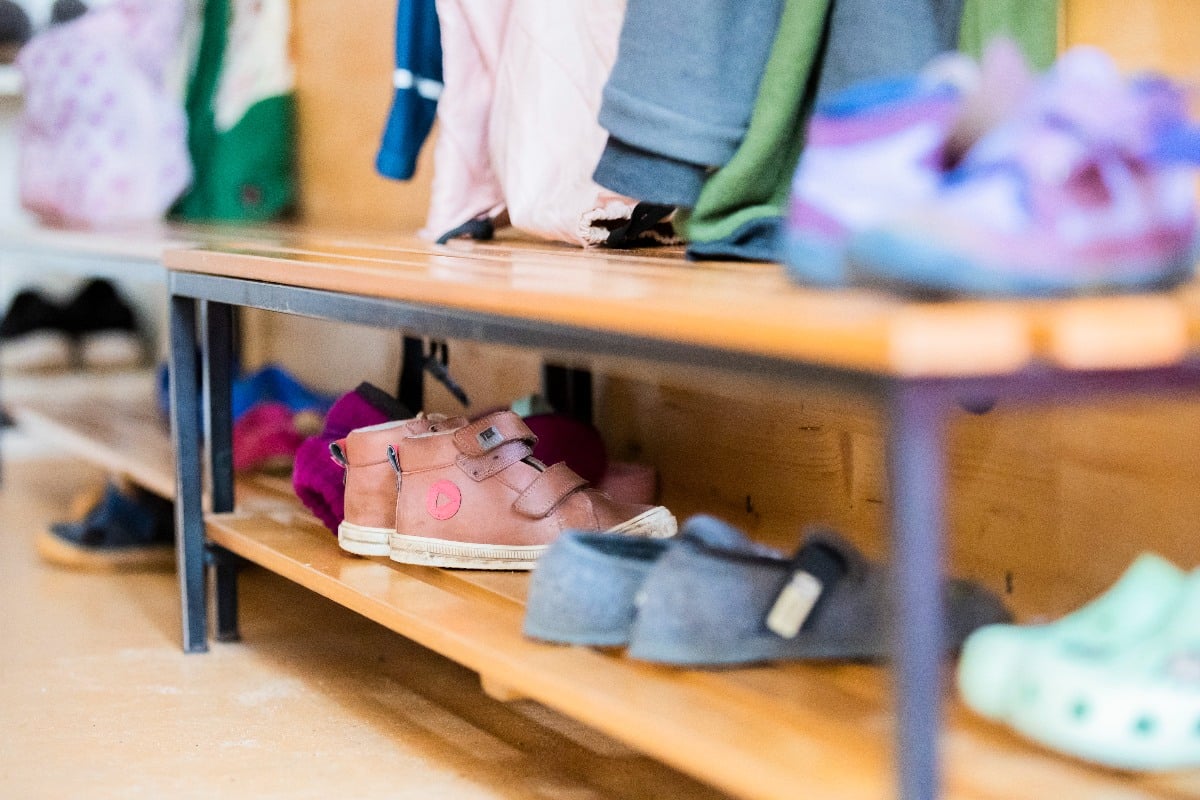You can access all of the articles covering the German federal election here.
There are around 14 million children and young people under the age of 18 in Germany who are not allowed to vote in the nationwide election on February 23rd - but will be hugely affected by it.
So just how are political parties in Germany pledging to support families? In the manifestos of leading parties, financial relief and the compatibility of family and career play major roles. But the party programmes generally lack details on how their promises would be implemented and funded.
However, the election programmes give us an idea of what each party will be pushing for when it comes to family policy.
CDU/CSU
The centre-right Christian Democrats (CDU) and its Bavarian sister party, the CSU, are still leading in the polls on around 29-30 percent. At the moment the CDU/CSU - often referred to as the Union - could be expected to lead a future coalition government with the Social Democrats (SPD) or Greens. For this reason, it's worth checking out what they are pledging.
READ ALSO: Which coalition governments are most likely after Germany's election?
The CDU/CSU says it wants to improve parental leave (Elternzeit), the partnership bonus (Partnerschaftsbonus) and parental allowance (Elterngeld) - but does not explain exactly how. There are also no concrete details on how they want to expand childcare facilities and places.
When it comes to family benefits, the Union, with chancellor candidate Friedrich Merz, says it wants to bundle them up and make them easier to access. The party promises to create a digital portal to make it easier to communicate with authorities. The conservatives also want to increase the child benefit (Kindergeld) but they do not specify the amount.
The parties pledge to increase tax relief for single parents. This could go up to €5,000 per year, at least according to the CSU's ‘Bavarian Agenda’. For families, the tax deductibility of childcare costs would be improved.
Meanwhile, the CDU/CSU is sticking to the principle of splitting the tax income of married couples (Ehegattensplitting), arguing that spouses who earn different amounts should not be disadvantaged.

As the CDU/CSU are keen on integration and have advocated for a Leitkultur - or dominant culture - you can also expect that they may be push for policies that promote youngsters with a migration background to learn German faster.
On the topic of reproductive care, you can expect the CDU/CSU to push against proposals to make abortion legal in Germany. Abortions are illegal under Section 218 of the German criminal code. However, they are tolerated in practice for women who are up to 12 weeks pregnant and have received compulsory counselling. There are also exceptions for women who have been raped or for medical reasons.
The CDU/CSU argues that current laws on abortion in Germany represent "a hard-won social compromise" that takes into account both the woman's right to self-determination and the protection of unborn life.
READ ALSO: Six things to know about abortion in Germany
The Union also wants to reverse the previous government's 'self-determination law'.
Social Democrats
The centre-left Social Democrats (SPD) are pledging to "make families strong".
The SPD, with current Chancellor Olaf Scholz who is running again as their main candidate, says it will extend parental allowance from 14 to 18 months, with the aim of providing greater incentives for fathers.
The party is also in favour of a ‘family start period’ (Familienstartzeit), with fathers or partners receiving paid special leave for the first two weeks after the birth of the child. This plan was already formulated by the previous traffic light coalition government led by the SPD and is stipulated by the EU as a directive.
READ ALSO: When will paid paternity leave in Germany be implemented?
The SPD wants to reform the taxation system for married couples to aim for a fairer distribution of the tax burden. The SPD also has tax relief plans for single parents and is proposing an annual "family budget for everyday helpers". It would see household-related services subject to social insurance contributions be subsidised directly.
Social Democrats are also campaigning for free and healthy lunches in daycare centres and schools, and is sticking to its policy aim for children's basic income support (Kindergrundsicherung). This plan, however, did not make it through the Bundestag in the latest term.
It remains to be seen how many of these projects would be funded should they make it past the negotiating table.
The SPD is also pushing for simplified and digital access to various benefits. The party also wants to enshrine children's rights in Germany's constitution and wants to allow voting from the age of 16.
READ ALSO: The big changes for families in Germany in 2025
Greens
The Bündnis 90/Die Grünen have several projects and pledges concerning families in their programme, but like other parties, they remain vague on funding.
"We will reduce the burden on families by around €1,000 a year," they vow in their manifesto, promising to adjust child benefits and support.
The Greens also want to see parental allowance, which has not been increased since 2007, rise from the current minimum of €300 to €400 per month and the maximum amount from €1,800 to €2,400. However, there is no mention of how this is to be financed.
Like the SPD, the Greens are in favour of the 'family start period' with paid leave for fathers or the other partner.
Funding for the expansion of childcare services also remains unclear. However, childcare costs should be tax-deductible and the Greens want to reform tax splitting of spouses, but only for new marriages.

For single parents, the Greens are campaigning for the tax burden to be reduced by a tax-free allowance.
The Greens are calling for a reform of reproductive laws, making abortion legal in the first 12 weeks.
The Greens are also in favour of unbureaucratic and free access to prescribed contraceptives for benefits recipients and low-income earners. Currently, contraceptives are not generally covered by health insurance in Germany for women over the age of 20.
READ ALSO:
- Which Social Democrat pledges should foreigners in Germany know about?
- The Green party pledges foreigners in Germany should know about
- What would a CDU election win mean for Germany?
AfD
The far-right Alternative for Germany (AfD) party is second in the polls after the CDU but is unlikely to get into government because of the 'firewall' mainstream parties have against working with the far right. But since they have a sizeable support base, here's a look at their plans for families.
With an "activating family policy", the AfD wants to encourage couples to have more babies to bring about a demographic turnaround in Germany.
The party advocates for a payment of €20,000 in pension contributions or a corresponding exemption from future payments to be issued for each child born.
The AfD is also planning a "childcare salary" up to the child's third birthday for parents or grandparents who provide care at home. It remains unclear how this is would be financed.
Other plans mentioned in their manifesto include increasing child allowance, reducing VAT on child-related items to seven percent and expanding childcare.
To improve the integration of children with a migration background, the AfD calls for German to be made a compulsory language in daycare centres.
The party rejects the calls to make abortion legal and is also not a fan of the previous government's self-determination law.
What about other parties?
It is unclear whether the below parties will clear the five percent hurdle to enter the Bundestag. But here's a quick glance at their key family pledges.
The Free Democrats have a focus on the compatibility of family and work, with vague plans to expand company kindergartens. The FDP wants to make parental allowance and other family benefits less bureaucratic, digitalise and automate them, for example through an AI-based app.
The party also calls for a modern reproductive medicine law, which should include the legalisation of egg donation and make surrogacy possible under a legal framework. The FDP also wants better financial support for fertility treatment, regardless of marital status or sexual orientation.

True to its leftist routes, Die Linke aims to protect all families and especially single parents, from poverty. It is calling for more financial relief, including increased child benefits and extra support for families in poverty. For a better work-life-balance, the Left Party is also in favour of society allowing people to work fewer hours for a full-time wage.
The left-conservative Sahra Wagenknecht Alliance (BSW) also wants to see a lot more financial support for families and calls for free lunches in daycare centres and schools. The BSW also wants an investment programme to support education and childcare infrastructure across the country.
The party also advocates for companies having to be more responsible when it comes to childcare in return for tax advantages.
READ ALSO: German elections - The key party pledges that will affect foreign residents

Comments